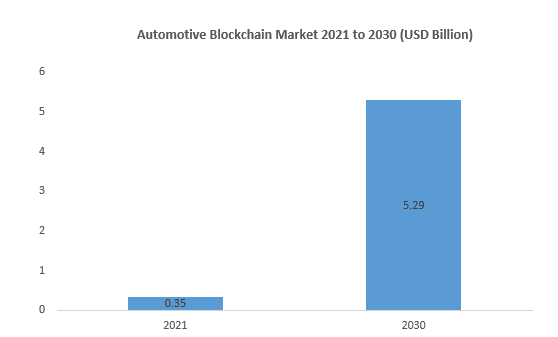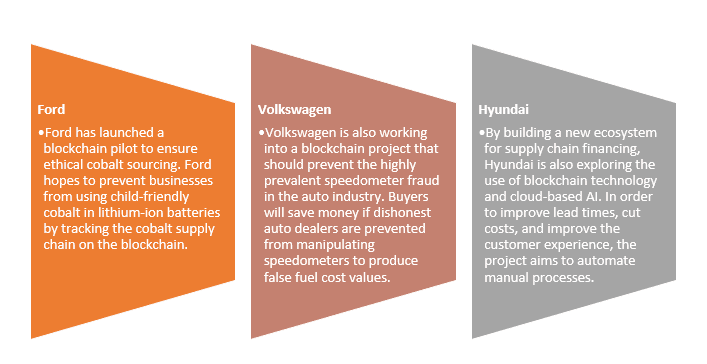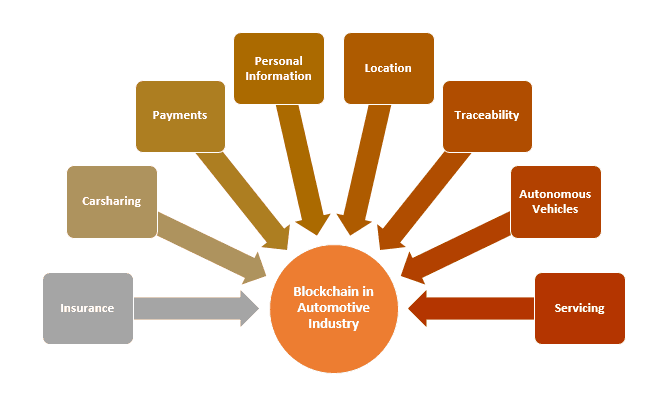Blockchain in Automotive Industry
The automotive industry is one of the sectors that could benefit the most from the blockchain revolution. Blockchain technology has always been linked to cryptocurrencies like Bitcoin. As more and more industry players adopt blockchain technology and explore its limitless potential, this way of thinking is quickly fading. In terms of realizing the potential of blockchain, the automotive industry is not far behind. Worldwide auto manufacturers like BMW, GM, and Ford have already placed relatively large cryptocurrency on blockchain technology. For instance, Ford is working to make Europe’s air quality better.
The need for faster business transactions, better quality control, and an increased focus on reducing data manipulation have all contributed to the growth of the automotive blockchain market. From 2021 to 2030, the automotive blockchain market is anticipated to grow to 31.19%.

Role of blockchain in the automotive industry
By facilitating more safe, service centers transactions, better access to, and openness of information, blockchain has the potential to increase trust and collaboration among businesses, consumers, and even cars. It is not surprising that automakers are interested in blockchain and are making some calculated investments in this space. When combined with the Internet of things (IoT), artificial intelligence (AI), and big data, blockchain has a greater potential to destroy the current system than it does on its own.
Current implementations of blockchain in the Automotive Industry:
In order to integrate blockchain technology within the comfort of your car, four of the largest automakers in the world have decided to team up with other cutting-edge businesses. Ford, BMW, Renault, and General Motors have offered support for the Mobility Open Blockchain Initiative, showing their commitment to researching blockchain technology (MOBI).

It is clear that blockchain technology has the potential to significantly advance the automotive sector’s supply chain operations, introduce tamper-proof record keeping, involves the planning, and support other innovative trends and technologies.
How is the automotive sector making use of blockchain technology?
Autonomous Vehicles: For autonomous vehicles to be safe, enormous amounts of data must be processed, analyzed, and delivered promptly. The blockchain is a reliable and safe way to do this.
Service: A car’s service history can be stored on the blockchain with just a quick QR code scan, and the technology can be used to make sure that only genuine OEM parts are used to make repairs or replacements.

Insurance: By using the blockchain to thoroughly verify and secure vehicle distances, drivers who don’t use their cars frequently may be able to get lower insurance rates.
Location: Using RFID tags and data stored in the blockchain, fleet owners can keep a track on the location of all of their vehicles and personnel. This could result in time and travel efficiency, especially in the package delivery sector.
Traceability: Blockchain can be used in the supply chain to trace the source of the components used to build a car all the way back to the raw material that was taken out of the mining.
Car sharing: An original equipment manufacturer provides vehicles on a timeshare basis (OEM). A single-source, usage-based payment system is used to instantly settle transactions between owners, companies, and third-party service providers, and trips are recorded on the blockchain.
History and Vehicles recalls: The VIN of a car can be managed in the blockchain, which means that If a recall is issued, owners of the specific vehicles with a problem can be notified, significantly reducing costs for manufacturers and inconvenience to drivers.
Payments: E-contracts are a significant asset that blockchain helps to power, which enable direct, secure money transfers from a buyer to a seller without the need for a bank or other intermediaries.
Conclusion:
Blockchain may provide an additional way to maximize the benefits of these technologies as the automotive industry shifts toward self-driving, connected, and electrified vehicles (EV). Supply chain, financial services, and the safe, secure sharing of driver or rider data seem to be the most suitable use cases. Due to its young individuals, there are still issues to be resolved, but given the level of sector – based investment, blockchain has the potential to create a significant amount of disruption.
For more detail Contact:
UnivDatos Market Insights
C 80B, Sector-8, Noida,
Uttar Pradesh 201301
For Sales related queries, please reach us at [email protected]
